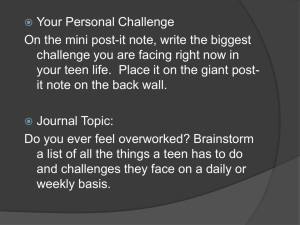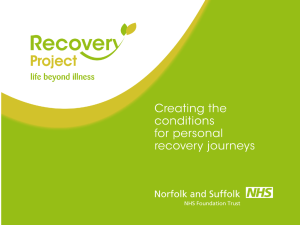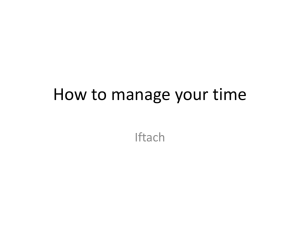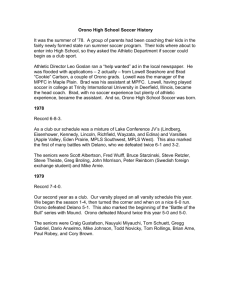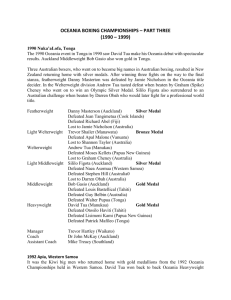Habit 3 Put First Things First
advertisement
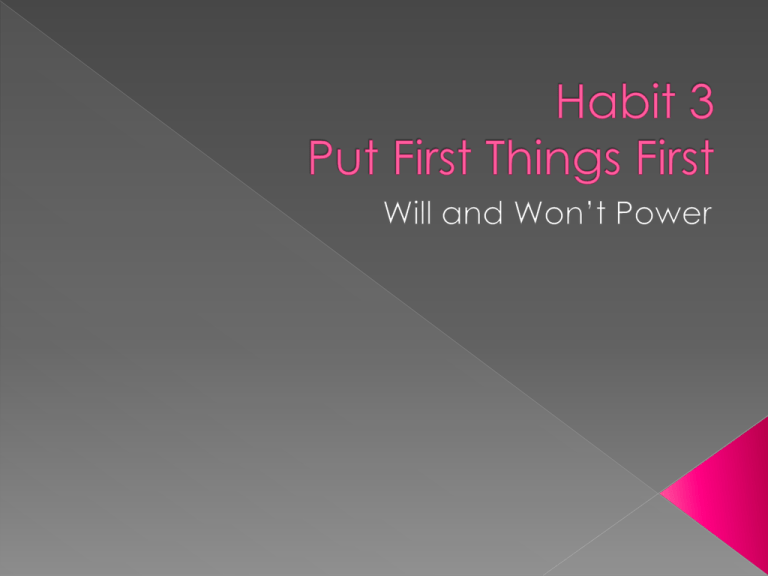
On the next clean page in your folder make a list of all the responsibilities you have in a week. Be sure to include school, chores, babysitting, extracurricular activities, sports, etc. Many of you may have just realized that the list of things you are responsible is VERY long. Do you have time for all these things each week? What happens when you don’t have time for something? How do you decide which tasks are most important? Habit 3 is Put First Things First It’s all about prioritizing and managing your time so that your first things really do come first and don’t end up last. Will-power is the strength to say yes to important tasks Won’t power is the ability to say no to less important things and peer pressure When you feel overwhelmed you need to feel confident in saying “no” Time quadrants can help you pack more in (especially important things) It’s made up of 2 ingredients: Important & Urgent Important: Your most important things, your first things, activities that contribute to your mission and goals Urgent: Pressing things, in-your-face things, activities that demand immediate attention Important Urgent Not Urgent 1: The Procrastinator 2: The Prioritizer •Test tomorrow •Late for school •Project due today •Car breaks down •Sibling gets hurt 3: The Yes-Man Not Important •Unimportant phone calls •Interruptions •Other people’s small problems •Peer pressure •Planning, goal setting •Essay due in a week •Exercise •Friendships, family •Relaxation 4: The Slacker •Too much TV •Endless phone calls •Excessive video/online games •Mall Marathons •Time Wasters Shrink Q1 by procrastinating less Say “no” to Q3 activities (phone calls, interruptions, peer pressure) Cut down on Q4 slacker activities Use your agenda to remind yourself of important assignment due dates Write dates and times of practices, after school activities, etc. Take time on Sunday to plan out your week Identify your BIG ROCKS! What are the most important things for this week? You might also think about your role as a student, friend, family, me, team Plan ahead so you have time for them If other things come up throughout the week, make an adjustment. Maybe a new assignment is due Wednesday and you need to push a book report back to Thursday- You are in control of your time The Comfort Zone is things you are familiar with such as places you have been, your friends, activities you enjoy. Your comfort zone is risk free since you have been there before. The Courage Zone is things like making new friends, speaking in front of an audience, sticking up for what you believe in. These can also be opportunities, adventure, risk, things that are difficult, etc. Make a new friend? Resist peer pressure? Break an old habit? Develop a new skill? Try out for a team? Audition for a play? Change your job? Get involved? Be yourself? He failed in business at age 21 Was defeated for the state legislature at age 23 Coped with the death of his sweetheart at age 26 Suffered a nervous breakdown at age 27 Was defeated for congressional nomination at age 34 Lost re-nomination for Congress at age 39 Was defeated for the senate at age 46 Was defeated for the vice presidency of the US at age 47 Was defeated for the Senate age 49 Two roads diverged in a wood, and II took the one less traveled by, And that has made all the difference. To overcome peer pressure you need to care more about yourself than what your peers think of you! You can build your confidence by adding to your Personal Bank Account You can also use your Personal Mission Statement It takes discipline to manage your time, overcome your fears, to be strong in hard moments, and to resist peer pressure. In a 7 Habits survey of thousands of people it was found that Habit 3 is the hardest to live by! Video

